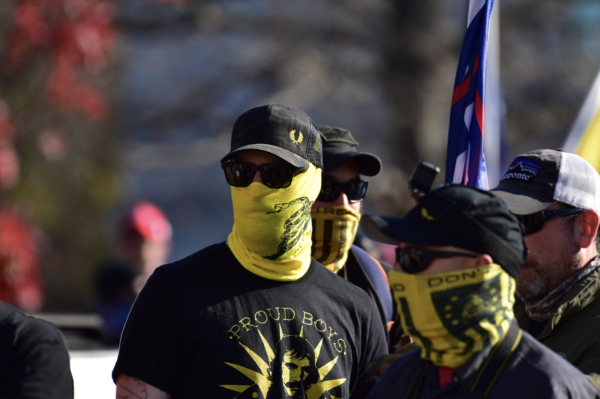
Proud Boys, Raleigh, North Carolina, 2020 (Photo: Anthony Crider)
A recent study by RAND Corporation investigates the levels of support for violent extremist groups and causes among U.S. Military Veterans.
The study sheds light on the complex interplay between military experiences, transitions to civilian life, and the emergence of extremist beliefs among Veterans. Following up from findings in 2022, researchers conducted in-depth interviews with Veterans who express support for extremist beliefs to examine the underlying causes of said extremism.
The interviews uncovered the impact of negative and traumatic events during military service and transitioning to civilian life, alongside narratives of involvement in extremist ideas and groups. Researchers analyzed how Veterans articulate their endorsement of extremist ideologies, their military experiences, transition to civilian life, and the factors influencing their current political views.
The study finds that most participants who previously supported groups like the Proud Boys retracted their support in later interviews, while others maintain beliefs such as the Great Replacement theory, linking it to perceptions of political agendas. Although many acknowledge the potential need for political violence, few express an intent to act. Traumatic experiences in the military, including interpersonal conflicts and combat trauma, are prevalent among interviewees, as are difficulties transitioning to civilian life, such as PTSD and homelessness.
Some interviewees attribute their extremist views to life events or socialization within their social circles. Participants cite the influence of friends, family, and social media in shaping their beliefs. Specific media sources, social media platforms, and political influencers are mentioned as contributing factors. These sources include Russia Today (or RT), Newsmax, CNN, Fox News, Facebook, Reddit or Telegram channels, podcaster Joe Rogan, and TV host George Stephanopoulos. The study also notes a lack of discussion regarding specific extremist groups, suggesting broader ideological support rather than explicit endorsement.
Participants often described challenging military experiences and struggles transitioning to civilian life, echoing broader academic literature. However, establishing a direct causal link between these experiences and radicalization proves difficult. Future research should explore these connections further, considering the potential risk factors associated with Veteran extremism, such as negative military experiences and transition stress.
While the study does not propose specific policies to mitigate Veteran extremism, it emphasizes the importance of supporting Veterans’ transition to civilian life through programs offered by the VA. Caution is needed to ensure that efforts to counter extremism do not inadvertently alienate Veterans from seeking support services. Understanding the complex interplay between military experiences, transition stress, and radicalization pathways is important for developing effective prevention strategies.













